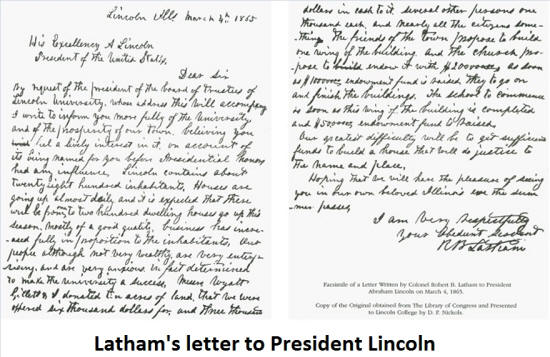|
 Paul recounted the horrific and paralyzing Civil War, which was
witnessed by all that both sides lost so very much — more lives,
causalities and property loss than any war before or since. He used
this short but vivid recounting to set the stage of Lincoln
University's "Rise from the Ashes" — which has led us to believe
that its formation, struggle and existence throughout the years was
in large part both a benevolent as well as an obligated undertaking
to forever establish and continue our fallen namesake's institution
of higher learning here in Lincoln, Illinois. Paul recounted the horrific and paralyzing Civil War, which was
witnessed by all that both sides lost so very much — more lives,
causalities and property loss than any war before or since. He used
this short but vivid recounting to set the stage of Lincoln
University's "Rise from the Ashes" — which has led us to believe
that its formation, struggle and existence throughout the years was
in large part both a benevolent as well as an obligated undertaking
to forever establish and continue our fallen namesake's institution
of higher learning here in Lincoln, Illinois.
Beaver explained that a group of Cumberland Presbyterians from the
Southern states established the First Presbyterian Church in
Lincoln, Illinois, in 1857 – believed to be the first such church of
their denomination in the northern states. Soon after, this Logan
County denomination made plans to help establish a university here,
which would also be their first such one in the northern states
(there had been other Presbyterian universities established in the
South).


He also showed a powerpoint copy of the letter by trustee, Col. Robert
B. Latham, sent to President Lincoln in early March, 1865. The
letter spelled out the existence of the University's charter
established earlier in the year and plans for an endowment. It also
mentioned, "...to inform you more fully of the University and of the
prosperity of our town, believing you feel a lively interest in it,
on account of its being named for you before Presidential honors had
any influence." Beaver provided additional documentation of Col.
Richard Oglesby's (later twice Governor of Illinois) visit to the
White House on the very day of Lincoln's assassination. Beaver and
the rest of us believe that President Lincoln and Oglesby must have
talked a bit about the formation of Lincoln University in the
President's name, albeit just a few days following Lee's surrender
at Appomattox on April 9th — just six days before the terrible deed.
Beaver pointed out that a Central Illinois land baron, William
Scully, reached into his vest pocket and took out a check. He
promptly made the check out for $5,000 for an immediate payment on
the University's loan note that was due. There were many others,
said Beaver, namely local cattle baron and a close friend of
Lincoln, John D. Gillette, who also solicited and provided funding —
with Gillette and Scully, probably lots of it.
[to top of second column] |

An extremely interesting side bar was revealed when Beaver told of
the invitation by a local Lincoln Presbyterian Church Pastor of John
Brown Gordon, a Confederate General who fought with Lee on the
Eastern front, to speak at his church in the late 1800's. The pastor
was also of Southern military background, but who long ago had
forgiven the North. He had grown to understand the fallen
President's fervent desire to keep the union intact as well as to
prove to the Europeans that the United States no longer harbored the
medieval institution of slavery. To aid in this transformation from
hatred and sorrow to love and acceptance, the Pastor invited General
Gordon to speak at one of his services — the General, himself,
having experienced this transformation.
Professor Beaver's description of the event from Chapter 7 of
his recent book, Abraham Lincoln in Logan County, Illinois —
1834 - 1860:
Signs that the wounds from the war had begun to heal were
evidenced on a winter evening on December 1, 1898, when over 500
local citizens, many Union veterans, gathered in the “new” First
Presbyterian Church on Pekin Street in Lincoln to hear an
address by former Confederate General John Brown Gordon. Gordon
had been one of General Robert E. Lee's most trusted commanders.
The man who introduced Gordon that evening was three-time
Governor of Illinois Richard J. Oglesby. The event was arranged
in part by the church's pastor, Dr. R. M. Tinnon, who himself
was a four-year Confederate war veteran who had suffered three
combat wounds, and with efforts by the local Leo W. Myers G.A.R.
Post. The article in the December 2, 1898 Lincoln Daily Courier
noted that General Gordon was often interrupted with applause
during his nearly two-hour address. Lincoln's population at this
time had grown to around 8,000.

The Elkhart Historical Society, at Wild Hare Café in Elkhart,
undertake an annual dinner/ lecture series, featuring speakers
who speak on engaging topics — often on some aspect of the
history of Logan County or of some former Logan County
personality of importance. Check these websites for future
events:
www.elkharthistoricalsociety.org and
www.wildharecafe-elk-il.com.
[Phil Bertoni] |